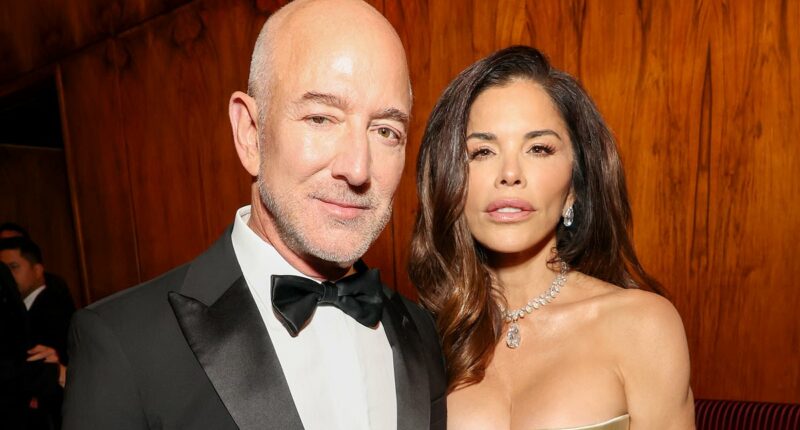Share this @internewscast.com
When two of the world’s most influential leaders passionately engage in a conversation about the nearing possibility of uncovering the secret to eternal life, it signals a moment to consider this topic with earnest attention.
Recently, during a conference, China’s premier Xi Jinping was overheard discussing with Russia’s President Vladimir Putin how scientific breakthroughs are paving the way for people to potentially live up to 150 years, with the possibility of achieving immortality not far behind.
In a move that began four years prior, Vladimir Putin initiated substantial investments amounting to millions into 43 anti-aging research initiatives, as reported by the independent Russian publication Novaya Gazeta. This is a significant increase from just seven such projects five years earlier.
Meanwhile, Silicon Valley magnates are channeling vast resources into anti-aging research. Notable figures include former Amazon CEO Jeff Bezos, 61; OpenAI’s chief Sam Altman, 40; Google’s co-founders Larry Page and Sergey Brin, both 52; and PayPal co-founder Peter Thiel, 58.
The pursuit of immortality is a time-honored quest, deeply rooted in human history. It is central to one of the oldest narratives known to humanity, the Epic of Gilgamesh, dating back to ancient Sumeria, present-day Iraq, around the 21st century BC.
This epic tells of King Gilgamesh, who cherished life immensely. After the death of a close friend, he embarked on a quest to find a legendary plant believed to restore youth. However, his journey concluded with him succumbing to a fever and meeting his end.
History is littered with failed bids for immortality – and while experts question whether our bodies are truly capable of living much longer (more on that later), now the ‘tech bros’ are pouring their money and effort into beating ageing.
And rather than focusing on the basics of healthy diet and exercise, they see it as akin to an engineering or software problem that needs solving, shooting for the moon with the latest technology to develop anti-ageing therapies.

Xi Jinping was overheard at a conference telling Vladimir Putin that ongoing scientific advances meant humans soon might ‘even achieve immortality’
Jeff Bezos, for example, has invested in a California-based biotech firm, Altos Labs, to see if they can find a way to activate genes that may rejuvenate human cells.
And Sam Altman has pumped £135 million in Retro Biosciences, a tech start-up that is exploring ways to engineer patients’ own aged cells so that they effectively become newborn again.
It’s not as if the rich and successful don’t already have a longevity advantage over the rest of us – the increased worth and self-confidence that people get from remarkable success is itself a life-extender, according to researchers at the University of Toronto in Canada. They reported in the Annals of Internal Medicine in 2001 that actors who win the Oscar live 3.9 years longer than their colleagues.
In the US, the nation’s richest live at least a dozen years longer than its poorest, the US National Institutes of Health reported in the Journal of the American Medical Association in 2016.
That advantage is not enough for the super-rich, it seems.
It’s not just the billionaires, however: the trend is even trickling down to the less well-heeled, with a boom in the number of high street ‘longevity’ clinics in the UK in recent years, offering everything from hyperbaric oxygen chamber therapy (which some studies suggest can slow the cellular ageing process) to cryotherapy – where you spend a few minutes in a chamber chilled to -85c to reduce harmful inflammation in the body.
Such is the demand that a UK medical-training organisation called the Apex Longevity Academy has now launched in London, declaring that: ‘Our mission is to empower healthcare professionals to enhance patient health and quality of life through cutting-edge education in longevity medicine.’
In 2013, there were less than 100 longevity clinics around the globe. Now there are more than 3,000.

Jeff Bezos, pictured with wife Lauren Sanchez-Bezos, has invested in a biotech firm, Altos Labs, to see if they can find a way to activate genes that may rejuvenate human cells

OpenAI founder Sam Altman has pumped £135 million into Retro Biosciences, a tech start-up exploring ways to engineer patients’ aged cells so that they effectively become newborn again
Ironically this comes at a time when improvements in life-expectancy are stalling dramatically, with the UK showing the worst performance of all.
Advances in public health and medicine in the 20th century meant that life expectancy in Europe improved year after year.
But now a landmark new study published in the journal Lancet Public Health has warned that since 2011, ‘England suffered the largest decline in life-expectancy improvement, with a fall in average annual improvement of 0.18 years, from 0.25 between 1990 and 2011 to 0.07 between 2011 and 2019’.
The researchers added: ‘The second biggest slowdown of life expectancy growth in Europe was in Northern Ireland [reducing by 0.16 years], followed by Wales and Scotland [both falling by 0.15 years].’
Deaths from cardiovascular disease and cancer were the primary causes of the general European decline, particularly as a result of junk food diets; other factors include obesity, high alcohol use, and low physical activity.
One of the study’s co-authors, Martin McKee, a professor of European public health at the London School of Hygiene & Tropical Medicine, told Good Health: ‘Life expectancy is the best indicator of the health of the population. Ours should be telling us as a nation that we need to be doing something.’
More dismally still, perhaps, is evidence showing that although we aren’t living significantly longer in the UK, we are spending ever more of our later years burdened by chronic illness. A report in The BMJ last year revealed that average healthy life expectancy has dropped over the past decade by 9.3 months for men in England and Wales (down to 62.4 years) and by 14 months for women (down to 62.7 years).
Given that life expectancy in the UK is currently 78.8 years for males and 82.8 years for females, the consequence is that millions of us are suffering decades of ill-health before we die.
To add further to this grim picture, IQ scores are also falling – and having a lower IQ is significantly associated with a greater risk of illnesses, such as dementia, diabetes and depression.
So could humanity soon divide into two separate populations, with hugely different health chances – a tiny population of super-rich and powerful immortals, and the rest of us living shorter and sicker lives – and becoming less intelligent? Among the Silicon Valley tycoons now pursuing longevity is biohacker Bryan Johnson, who founded the payments platform Braintree and now famously leads a movement called Don’t Die.
Johnson, 48, reportedly spends a quarter of a million dollars a year in that pursuit of longevity.
His regimen has included undergoing high-frequency stimulation of his abdomen to simulate the effect of 20,000 sit-ups. He also restricts his calories intake to 1,977 a day in the hope that this mild constant starvation might make his body last longer (it works for tiny nematode worms in lab studies, though no similar benefit has been reliably found in humans).
Another leading light is Peter Diamandis, 64, who amassed his fortune as a prolific entrepreneur and investor.
In 2023 he launched a £60 million prize for the team who can devise a treatment by 2030 that takes 20 years off our muscles, brain and immune system.
Diamandis himself is reported to rise at 5.30am and after assessing his overnight body readings, gathered by three different monitors, he consumes the first of five daily pill packs – which include tablets for weight-management, energy boosts, stress-reduction and brain enhancement.

Biohacker Bryan Johnson reportedly spends a quarter of a million dollars a year in the pursuit of longevity
Meanwhile at Fountain Life, the longevity clinic he established, the well-heeled pay £75,000 annually for comprehensive care aimed at banishing disease.
His companies are investing in implantable sensors that will constantly send data digitally to AI programs for assessment and diagnosis, monitoring people’s voices, the sound of their coughs, how they walk and even go to the loo to check for signs of incipient illness.
In January this year, the leading artificial-intelligence researcher Dario Amodei declared at the World Economic Forum that accelerated advances in AI, particularly in biology, can lead to a doubling of human lifespans in as little as five to ten years ‘if we really get this AI stuff right’. He did not explain, however, in practical terms how this might happen.
Indeed none of the novel longevity therapies being pioneered by the Silicon Valley tycoons is proven in any conventional sense – they’ve not been trialled in large populations, with the results rigorously and independently examined before being published in a reputable scientific journal.
And are they largely wasting their time and money?
Some leading scientists doubt whether it’s even possible to extend human life much further, that we’ve already reached its outer limits.
In 2024, Stuart Jay Olshansky, a professor of public health at the University of Illinois at Chicago, led a study published in Nature Aging which declared that, on the available evidence, ‘radical extension to human life expectancy is implausible in this century’.
The researchers pointed out that although during the 20th century life expectancy rose in high-income nations by approximately 30 years, largely driven by advances in public health such as sanitation, and more effective medicine (such as vaccinations and antibiotics) – ‘it was unclear whether this would continue into the 21st century’.
Their study showed that the pace of increase in average life expectancy has slowed of late, and ‘our analysis suggests that survival to age 100 is unlikely to exceed 15 per cent for females and 5 per cent for males’.
Maximum human lifespan is defined the maximum length of time that a person can live.
Currently the maximum is considered to be 122 years – the lifespan of the longest-lived person with a verifiable date of birth. That record is held by Jeanne Calment, a French woman who died in 1997.
For men, maximum lifespan is shorter. The verified longest-lived man was Jiroemon Kimura of Japan, who died in 2013 at age 116.
As for the billionaires’ efforts to leave the rest of the world behind, Professor McKee is markedly sceptical of their chances of success: ‘People with that amount of money want to create themselves into a race apart. But I am far from convinced that the rhetoric will meet the reality. What they are doing is only an interesting social phenomenon, rather than a scientific breakthrough.’
In fact, while scientists race to find the next big technological solution to getting old, the best way to add years to your life at the moment is through good old-fashioned healthy lifestyle, to ward off the threat of age-related deadly illnesses such as cancer, heart disease and dementia.
A 2023 study by the University of Bergen, Norway and published in the journal Nature Food, looked at data from around 500,000 people who signed up to UK Biobank – a database of health and genetic information.
It found that 40-year-olds who abandoned junk-food diets, processed meat and sugary drinks in favour of more wholegrains, nuts and fruits could add 10.8 years to their life if they were a man and 10.4 for a woman.
Career success also helps, according to researchers from the University of Toronto in Canada.
As Nick Steel, a clinical professor in public health at the University of East Anglia, told Good Health, as individuals we can all do two crucial things to improve our longevity chances.
‘Two of the biggest things that people who live longer and healthier lives do is to eat healthier food – and spend less time each day sitting down.’








